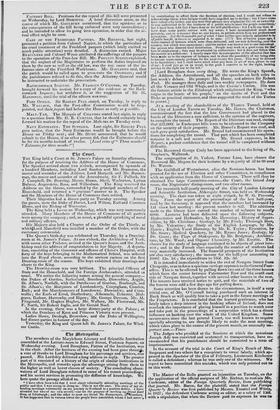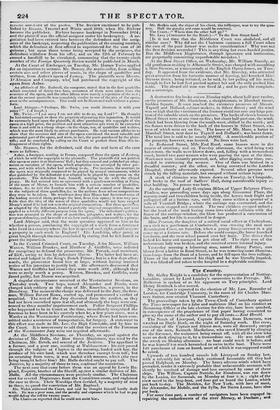The Master of the Rolls granted an injunction on Tuesday,
on the the application of the official assignee of Mr. Richter, to restrain Mr. Cochrane, editor of the Foreign Quarterly Review, from publishing that journal. Mr. Bacon, for the plaintiff, stated that the Foreign Quark-1y Review was first published by Messrs. Treuttel and Wiirtz, in 1827; the defendant Cochrane acting as editor, at a salary of 150L. with a stipulation, that when the Review paid its expenses he was tor .Seeeive one-tonal of the proles. The Review continued to be pub- lished by Meesrs. Treuttel and Wiirtz until 1833, when Mr. Richter became the publisher. Richter became bankrupt in November IS434; and the pinintiff was the official assignee under his bankruptcy. A ne- gotiation hid been entered into between the defendant and the assig- nees of the bankrupt, respecting the publication of the ensuing number, which the defendant at first offered to superintend for the sum of 50 guineas ; but upon those terms being eccepted by the assigeees, the defendant withdrew from his offer, and on the 12th of February he eaused a handbill to be eirculuted, announcing that the twentvoinith number of the Foreign Quarterly Review would be published in Match.
At the Court of Exchequer, on Tuesday, Mr. Horace Twiss applied for an injunction to restrain Mr. Boosey, the music-seller, from selling eertnin airs and other pieces of music, in the shape of quadrilles and waltzes, from Auber's opera of Lestocq. The plaintiffs were Messrs. D'Almaine and Company, who: bad purchased the copyright of the opera from Auber.
An affidavit of Mr. Rodwell, the composer, stated that in the first quadrille, which consisted of thirty-two bars,. seventeen of them were taken front the overture of the opera, and the other fifteen were merely a repetition of the last ; that the second quadt ille was completely similar to one of the airs of the opera, even to the accompaniment. This could not be illustrated well without a piano- forte. Lord Abinger—" Perhaps, Mr. Twiss, you could illustrate it with your yoice ? " (A laugh.) Mr. Twiss—" I am sorry I am not able to do so, my Lord ?" He thought Ise had stated enough to show the propriety of granting this injunction. It would be extremely hard upon the plaintiffs, if, after purchasing the copyright of the opera ate high price, the prettiest and most attractive airs were to be extracted from it and sold In a cheap shape—in the shape, too, of quadrilles and waltzes, which was the most likely to attract purchasers. He read vat ious affidavits to show that the overtute and airs of the opet a constitued the most valuable and Aubstantial part of the opera, and were, in fact, the parts purchased by the plain- tiffs; and he concluded by calling on the Court to protect them front this in- fringement of their rights.
Mr. Beames, for the defendant, said that the real facts of the case .were as follows.
Auber, a foreigner, residing in France, composed there the opera of lestorq, of whirl, he sold the copyright to the plaintiffs. The plaintiffs did not publish this opera or enter it at Stationer' Hall ; but they entered and published an adap- . tuition or variation of the opera, which adaptation was arranged by other per- sons, and with which Auber had nothing to do. For instance, the overture to the opera was originally composed to be played by several instruments, whilst that published by the defendant was adapted to be played by one person on the pianoforte. The defendant had, himself, nothing to du with the alleged piracy. Ile had entered into an agreement with a gentleman residing at Paris, of the name of Muzar, to furnish him with a certain number of quadrilles, waltzes, Rte. to suit the London season. He had no control over Muzar, as to the subjects of these quadrilles, tee. or the authors front whose compositions they were to be taken. Ile would not deny that Muzar had borrowed some of the leading musical ideas, perhaps the best, front this opera; it was very pro- bable that the idea of the music of those quadrilles would not have entered Muzar's mind if he had nut seen the original composition. But these quadrilles, as adapted by the defendant, formed a perfectly original coin pus.t.on, and were Applied to a totally different purpose from the opera. The defendant's publica. Con was arranged in the shape of quadrilles, galoparles, and waltzes, for the purpose of dancing, and he could ma see how such a publication could be a piracy.
Lord Abinger said, that the main question appeared to him to be whether a person, purchasing the copyright of a work front a foreigner who lived in a country where the law respected such right, could acquire a property in such work in England ? His Lordship, after going at great length through the case, concluded by stating that Ile felt bound to grant the injunction.
In the Central Criminal Court, on Tuesday, John Mason, William Warren, William Brookes, and Matthew J. Griffiths, were indicted for conspiracy to defraud the prosecutor, Mr. Pocock, coal- merchant, of 2501., owing to hint by defendant Mason. The latter had been ar- rested and lodged in the King's Bench Prison ; but in a few days after- wards, the prosecutor found him at large, without having received notice of his intention to justify hail. He afterwards discovered that - Warren and Griffiths had sworn they were worth 5001., although they were sexcely worth a penny. Warren, Brookes, and Griffiths, were found guilty, but Mason was acquitted.
A singular circumstance occurred at the Westminster Sessions, on Thursday week. Two boys named Alexander and Harris, were charged with robbery at the ;hop of Mr. Knowles, a grocer, in the iiroadway. The moment the charge was delivered to the Jury, the fore- man, William Robert Rowe, started up, and pronounced it verdict of acquittal. The rest of the Jury dissented from the verdict, as they bad not been consulted upon hat all, and ultimately the boys were sen- tenced to three months' imprisonment each. Police Sergeant Phillips who happened to be in Court at the time, immediately recognized the foreman to have been in his custody when he, a few years since, was a Warder at the Westminster Penitentiary, where Rowe had been com- mitted under a sentence of transportation, for forgery. A statetnent to this effect was made to Mr. Lee, the High Constable, and by him to the Court. It is unnecessary to add that the services of the Foreman -of the Westminster Jury were not required afterwards.
At the Middlesex Sessions, on Thursday, an appeal against the decision of Mr. Halls, the Bow Street Magistrate, was flied by the Chairman, Mr. Botch, and several of the Justices. The appellant is a farmer, and a poor One, residing at Waltharnstow : his cart passed through the tollgate at Clapton in the morn*, loaded with hay, the produce of his own land, which was therefore exempt from toll ; but on returning from town, it was loaded with manure, which (the case being brought before him) Mr. Halls decided ought to pay toll. The jtniireS, by a majority of three to two, confirmed the conviction. The next case that came before them was an appeal by Lewis Ra- phael, Esquire, brother of the Sho iff, against a similar decision of Mr. Hells. All the circumstances were precisely similar. The Chairman sent for several Magistrates from the Committee-room, and explained the case to them. Their Worships then decided, by a majority of nine to three, to quash the conviction of Mr. Raphael. Mr. Welch addreased the Court, and said he thought himself hardly dealt with. lie was a poor man, and the penalty and expenses which he had to pay . would defray the toll for twenty years. The Chairman legit:tied that he could not assist Mir. Mr. Bodkin said, the object of his client, the tollkeeper, was to try the ques- tion. Half the penalty and costs would be remitted. The Court—" Where does the tither half go?" Mr. Levy (Contractor for the Roads)—". To the Bow Street fund."
[Is it not time that the Middlesex Court was abolished, and all similar ones? Why did not the Chairman summon a full Court when the case of the poor farmer was tteder consideration? Why was not the first decision overruled ? This is imy thing but even-handed justice. But the Middlesex Magistrates, through ignorance and inattentioe, arc perpetually committing unpardorable mistakes.1 At the Bow Street Office, on Wednesday, Mr. William Stavely, an old gentleman residing in Albemarle Streist, was charged with assaulting a Miss Stevens, at a masquerade at the English Opera-house, on Tues- day. It appeared from the evidence, that Mr. Staveley, who attracted great attention from his fantastic manlier of dancing, had knocked Miss Stevens down ; being irritated, us he said, by her pulling off his mask, though in fact he bad first pushed against her and she only pushed him aside. The absurd old man was fitted .5/. ; and he gave the complain- nut a sovereign.



























 Previous page
Previous page